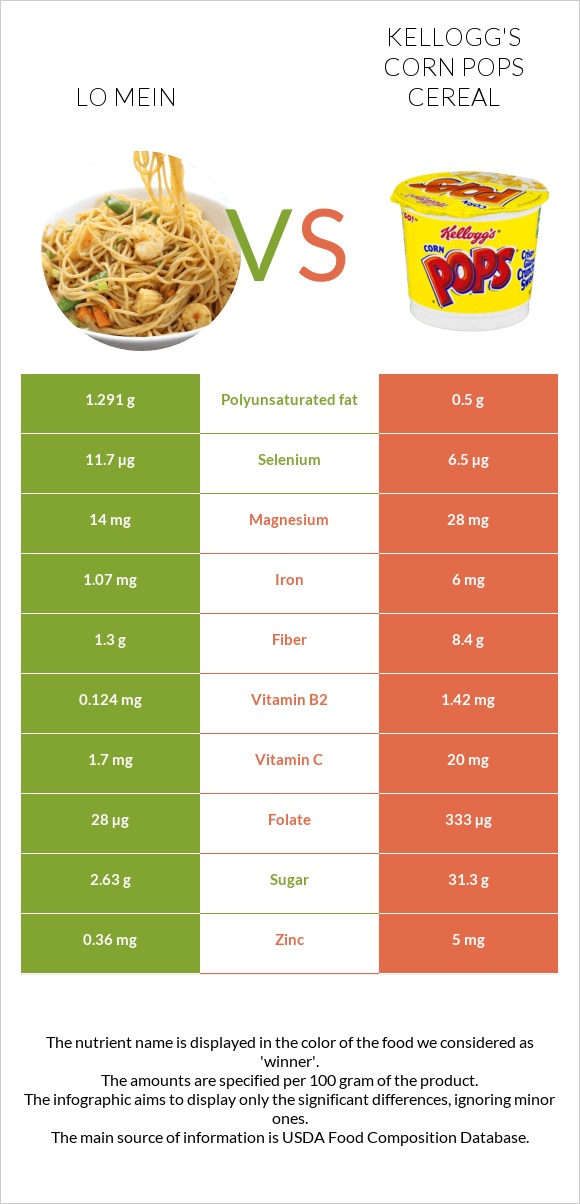Lo mein vs. Kellogg's Corn Pops Cereal — In-Depth Nutrition Comparison
Compare
Summary of differences between lo mein and kellogg's Corn Pops Cereal
- Lo mein has less vitamin B12, vitamin B6, vitamin B1, vitamin B2, vitamin B3, folate, iron, zinc, vitamin A, and fiber than kellogg's Corn Pops Cereal.
- Kellogg's Corn Pops Cereal covers your daily need for vitamin B12, 208% more than lo mein.
These are the specific foods used in this comparison Restaurant, Chinese, vegetable lo mein, without meat and Cereals ready-to-eat, KELLOGG, KELLOGG'S CORN POPS.
Infographic

Infographic link
Mineral Comparison
Mineral comparison score is based on the number of minerals by which one or the other food is richer. The "coverage" charts below show how much of the daily needs can be covered by 300 grams of the food.
| Contains more CalciumCalcium | +200% |
| Contains more ManganeseManganese | +44.6% |
| Contains more SeleniumSelenium | +80% |
| Contains more MagnesiumMagnesium | +100% |
| Contains more IronIron | +460.7% |
| Contains more CopperCopper | +29.7% |
| Contains more ZincZinc | +1288.9% |
| Contains more PhosphorusPhosphorus | +15.6% |
| Contains less SodiumSodium | -17% |
Vitamin Comparison
Vitamin comparison score is based on the number of vitamins by which one or the other food is richer. The "coverage" charts below show how much of the daily needs can be covered by 300 grams of the food.
| Contains more Vitamin EVitamin E | +150% |
| Contains more Vitamin B5Vitamin B5 | +19.5% |
| Contains more Vitamin KVitamin K | +∞% |
| Contains more Vitamin CVitamin C | +1076.5% |
| Contains more Vitamin AVitamin A | +5088.9% |
| Contains more Vitamin DVitamin D | +3200% |
| Contains more Vitamin B1Vitamin B1 | +2559.6% |
| Contains more Vitamin B2Vitamin B2 | +1045.2% |
| Contains more Vitamin B3Vitamin B3 | +1961.7% |
| Contains more Vitamin B6Vitamin B6 | +2355.9% |
| Contains more Vitamin B12Vitamin B12 | +∞% |
| Contains more FolateFolate | +1089.3% |
All nutrients comparison - raw data values
| Nutrient |  |
 |
DV% diff. |
| Vitamin B12 | 0µg | 5µg | 208% |
| Vitamin B6 | 0.068mg | 1.67mg | 123% |
| Vitamin B1 | 0.047mg | 1.25mg | 100% |
| Vitamin B2 | 0.124mg | 1.42mg | 100% |
| Vitamin B3 | 0.81mg | 16.7mg | 99% |
| Folate | 28µg | 333µg | 76% |
| Iron | 1.07mg | 6mg | 62% |
| Vitamin A | 9µg | 467µg | 51% |
| Zinc | 0.36mg | 5mg | 42% |
| Fiber | 1.3g | 8.4g | 28% |
| Carbs | 20.16g | 89.7g | 23% |
| Vitamin C | 1.7mg | 20mg | 20% |
| Vitamin D | 4 IU | 133 IU | 16% |
| Vitamin D | 0.1µg | 3.3µg | 16% |
| Calories | 121kcal | 387kcal | 13% |
| Vitamin K | 12.7µg | 0µg | 11% |
| Selenium | 11.7µg | 6.5µg | 9% |
| Starch | 16.73g | 7% | |
| Polyunsaturated fat | 1.291g | 0.5g | 5% |
| Magnesium | 14mg | 28mg | 3% |
| Sodium | 430mg | 357mg | 3% |
| Manganese | 0.24mg | 0.166mg | 3% |
| Fats | 2.35g | 1.3g | 2% |
| Copper | 0.064mg | 0.083mg | 2% |
| Calcium | 21mg | 7mg | 1% |
| Phosphorus | 45mg | 52mg | 1% |
| Vitamin E | 0.3mg | 0.12mg | 1% |
| Vitamin B5 | 0.27mg | 0.226mg | 1% |
| Monounsaturated fat | 0.592g | 0.2g | 1% |
| Protein | 4.77g | 4.8g | 0% |
| Net carbs | 18.86g | 81.3g | N/A |
| Potassium | 105mg | 113mg | 0% |
| Sugar | 2.63g | 31.3g | N/A |
| Trans fat | 0.008g | 0g | N/A |
| Choline | 8.9mg | 7.1mg | 0% |
| Saturated fat | 0.464g | 0.5g | 0% |
| Fructose | 0.33g | 0% | |
| Omega-3 - ALA | 0.141g | N/A | |
| Omega-6 - Gamma-linoleic acid | 0.004g | N/A | |
| Omega-6 - Eicosadienoic acid | 0.001g | 0g | N/A |
| Omega-6 - Linoleic acid | 1.134g | N/A |
Macronutrient Comparison
Macronutrient breakdown side-by-side comparison
Protein:
4.77 g
Fats:
2.35 g
Carbs:
20.16 g
Water:
71.33 g
Other:
1.39 g
Protein:
4.8 g
Fats:
1.3 g
Carbs:
89.7 g
Water:
3 g
Other:
1.2 g
| Contains more FatsFats | +80.8% |
| Contains more WaterWater | +2277.7% |
| Contains more OtherOther | +15.8% |
| Contains more CarbsCarbs | +344.9% |
~equal in
Protein
~4.8g
Fat Type Comparison
Fat type breakdown side-by-side comparison
Saturated fat:
Sat. Fat
0.464 g
Monounsaturated fat:
Mono. Fat
0.592 g
Polyunsaturated fat:
Poly. Fat
1.291 g
Saturated fat:
Sat. Fat
0.5 g
Monounsaturated fat:
Mono. Fat
0.2 g
Polyunsaturated fat:
Poly. Fat
0.5 g
| Contains more Mono. FatMonounsaturated fat | +196% |
| Contains more Poly. FatPolyunsaturated fat | +158.2% |
~equal in
Saturated fat
~0.5g





